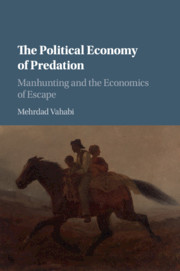‘Standard economics has long assumed a society of free, contracting individuals with equal legal rights. Power and authority are understood in contractual terms. In his most powerful statement to date, Mehrdad Vahabi challenges all that. Violence and subjugation are brought back into the picture. We are forced to rethink everything.'
Geoffrey M. Hodgson - University of Hertfordshire
‘Mehrdad Vahabi is an exceptional thinker. His truly interdisciplinary book draws on a deep knowledge from diverse disciplines. It promises profound insights on predation, which is one of the most fundamental aspects of human interaction.'
Kai A. Konrad - Managing Director, Max Planck Institute for Tax Law and Public Finance
‘The dark aspects of life (conflict, violence, predation, manhunt, enslavement, aggression) are studied by various disciplines and research programs, including history, psychology, mathematical game theory, criminology, political philosophy, and economics. Mehrdad Vahabi's book is unique, as he, a genuine interdisciplinary thinker, overviews the so far separated analyses and enriches them with important new ideas.'
János Kornai - Professor of Economics Emeritus, Harvard University, Connecticut and Corvinus University of Budapest
‘A fascinating and provocative analysis of predators and their prey. Mehrdad Vahabi's book will stimulate the minds of all who have been intrigued by the political economy of coercion.'
Peter T. Leeson - Duncan Black Professor of Economics and Law, George Mason University, Virginia
‘In this compelling book, Mehrdad Vahabi delivers an in-depth analysis of the logic of conflicts and predation. In doing so he is proposing a new and much needed economic perspective on violence as a core component of human societies.'
Claude Ménard - University of Paris (Panthéon-Sorbonne)
‘In this book Mehrdad Vahabi examines one-sided conflicts in many different settings. In many such situations, despite the seeming helplessness of the prey, he shows many possibilities for escape that are surprising (and gives hope for the condition of the less powerful). Vahabi draws upon - and usefully integrates - vast and diverse literatures, ranging from economics and the other social sciences to the history of thought and biology.'
Stergios Skaperdas - University of California, Irvine
'A work of great originality and ambition. Mehrdad Vahabi's concept of predation is an illuminating lens through which to see different forms of rule. The idea of domestication as a ‘prolonged’ form of predation, compatible with the survival (indeed, possibly thriving) of the object (plant, mammal, homo-sapiens) of that predation is, I think, very good to think with.'
James C. Scott - Sterling Professor of Political Science and Anthropology, Yale University, Connecticut
'In this ambitious work, which stands at the crossroad of Public Choice and New institutional Economics, Mehrdad Vahabi relies on the concept of predation to revisit the analysis of the genesis of the state, states conflict and the transition from autocracy to democracy.'
Bertrand Crettez
Source: Œconomia
'Some books appear quite surprising, disturbing or even pretty far from what economists can expect. This is particularly the case when authors look beyond traditional methodology in order to challenge existing research agendas. Nevertheless, few of such books provide a true renewal of thought. Mehrdad Vahabi’s The Political Economy of Predation: Manhunting and the Economics of Escape belongs to such category. This book represents an ambitious and disturbing work, but in a positive way. It really provides new perspectives of research agenda with regard to the place of violence as an intrinsic feature of human interactions.'
Renaud Bellais
Source: Defence and Peace Economics





